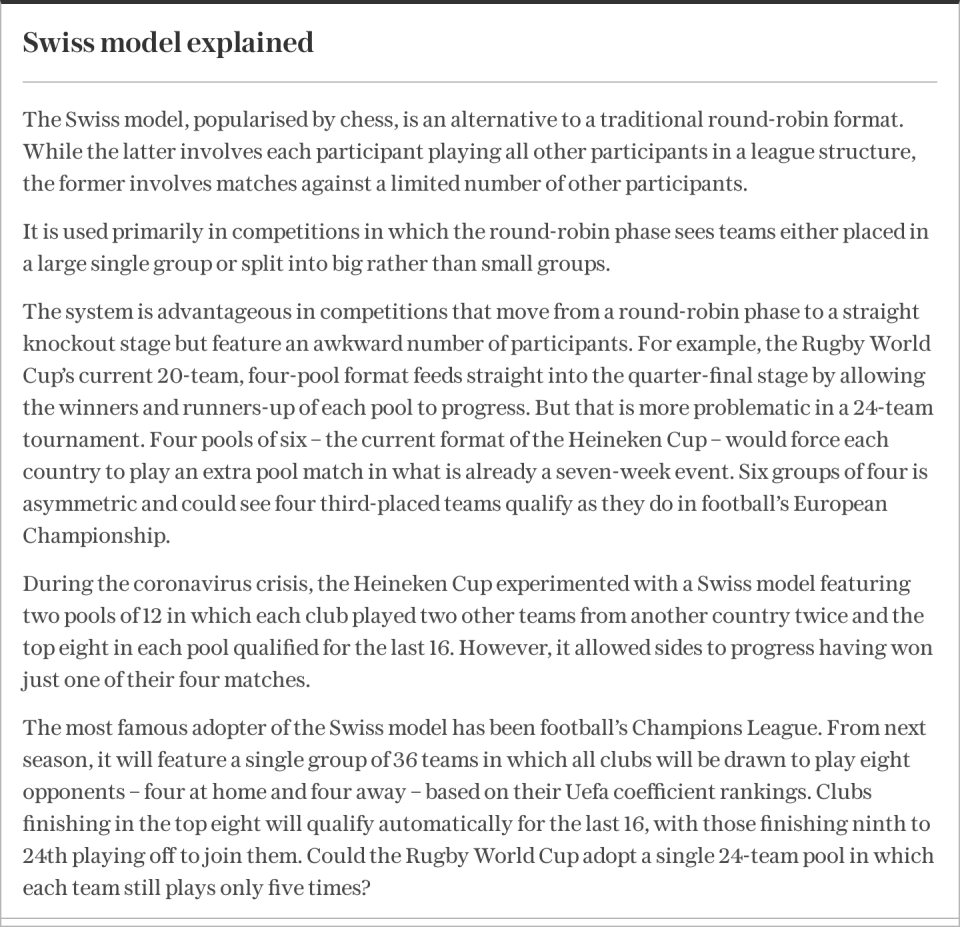Rugby World Cup organisers eye expanded 24-team tournament and new pool-stage format

The next Rugby World Cup is closer than ever to expanding to 24 teams following the emerging nations’ performances at the current tournament.
A ‘Swiss model’ pool stage similar to those adopted by the Heineken Cup and football’s Champions League is also under consideration as part of the first change to the size of the sport’s flagship event since 1999.
World Cup expansion has been among the hottest topics during the current tournament, which World Rugby is closely monitoring before deciding whether to add another four teams to the event from 2027.
Alan Gilpin, its chief executive, has thrown his weight behind the expansion plans and told Telegraph Sport “the signs are very positive” following the performances of the likes of Chile and Portugal in France.
Chile have lost all their matches on what has been their World Cup debut but took shock leads against both Japan and Samoa and kept England at bay for 20 minutes on Saturday before succumbing 71-0.
The same day saw Portugal, in their second appearance in the competition, were within two minutes of shocking Georgia before drawing 18-18, having earlier restricted Wales to a 28-8 win.

Asked about World Cup expansion, Gilpin said no decisions had been taken but added: “I personally believe you’ve got to do it, you’ve just got to commit to it and then you invest in the high-performance programmes of the teams that are likely to be those four-to-six teams.
“Chile had a tough match against a very strong England side who played some great rugby at the weekend. Chile played brilliantly against Japan the first game in this World Cup. Portugal, I mean, how amazing have Portugal been in this tournament? In the Rugby World Cup for the second time; Chile for the first time. And so on. The signs are very positive.”
Expansion would bring its own challenges, with the current 20-team tournament currently among the longest world championship in any sport at seven weeks.
Gilpin acknowledged a 24-strong pool stage would be more “awkward” given it would need to feed into either an eight or 16-team knockout round.
European Professional Club Rugby experimented with two pools of 12 in a Swiss model-style Heineken Cup format where each team played four matches to determine who qualified for the last 16.
That reduced the jeopardy of the pool stages and was scrapped for this season.

From next term, football’s Champions League will adopt a single group of 36 teams in which each side will play eight matches.
“The Swiss model that EPCR’s tried is very vogue,” said Gilpin, who confirmed a similar model was under consideration along with other formats. “We are literally looking at all of that.”
Six groups of four teams, four of six, or even three of eight, would bring their own problems, but Gilpin said: “There are lots of great reasons why expanding to 24 teams is the right thing to do.”

